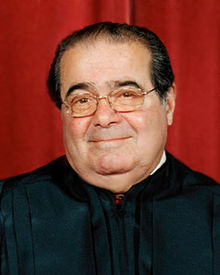It’s all to the good that Indiana’s Republican leaders have now agreed to make sure the state’s Religious Freedom Restoration Act does not permit discrimination on the basis of sexual orientation, but it’s hard to applaud the way they got there. And for that we have Justice Antonin Scalia to thank.
That’s because legislative politics is just what he intended when he changed the way the country deals with religious freedom claims in Employment Division v. Smith (1990), the case that led to passage of the federal Religious Freedom Restoration Act, and all subsequent state RFRAs.
Smith involved a couple of Native Americans who were fired from their jobs as drug counsellors in Oregon because they smoked peyote as part of the rituals of the Native American Church. They sued for unemployment benefits on the grounds that the First Amendment gave them the right to practice their religion. Writing for the Court, Scalia rejected the Court’s requirement that the government demonstrate a “compelling interest” in the law or regulation in order to reject a Free Exercise claim for an exemption.
Attacking the compelling interest test as a “constitutional anomaly” in Free Exercise cases, Scalia declared that “[a]ny society adopting such a system would be courting anarchy, but that danger increases in direct proportion to the society’s diversity of religious beliefs, and its determination to coerce or suppress none of them.” However, he continued:
Values that are protected against government interference through enshrinement in the Bill of Rights are not thereby banished from the political process…It may fairly be said that leaving accommodation to the political process will place at a relative disadvantage those religious practices that are not widely engaged in; but that unavoidable consequence of democratic government must be preferred to a system in which each conscience is a law unto itself or in which judges weigh the social importance of all laws against the centrality of all religious beliefs.
This view was rejected by Justice Sandra Day O’Connor, who contended that under the old standard, there was sufficient grounds for rejecting the Native Americans’ claim. “Although I agree with the result the Court reaches in this case, I cannot join its opinion,” she wrote. “In my view, today’s holding dramatically departs from well-settled First Amendment jurisprudence, appears unnecessary to resolve the question presented, and is incompatible with our Nation’s fundamental commitment to individual religious liberty.” Arguing against Scalia’s preference for throwing religious liberty into the political arena, she quoted from Justice Robert Jackson’s opinion in West Virginia State Board of Education v. Barnette, the landmark case that recognized the right of children not to be required to say the Pledge of Allegiance.
The very purpose of a Bill of Rights was to withdraw certain subjects from the vicissitudes of political controversy, to place them beyond the reach of majorities and officials and to establish them as legal principles to be applied by the courts. One’s right to life, liberty, and property, to free speech, a free press, freedom of worship and assembly, and other fundamental rights may not be submitted to vote; they depend on the outcome of no elections.
Smith has led to conflict at the state level all over the country over whether and to what extent there can be religious exemptions from anti-discrimination law. This involves basic questions about how we as a society balance fundamental rights. The vagaries of political processes are no substitute for judicial determination of such questions. O’Connor had it right.






